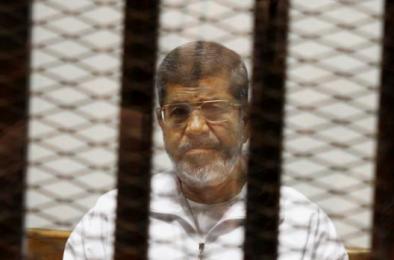Sudanese Muslim Brotherhood criticize gov’t stance over Morsi’s death sentence
May 20, 2015 (KHARTOUM) – The controller-general of the Sudanese Muslim Brotherhood, Ali Gawish, has vehemently attacked the stance of the government towards the death sentence issued by an Egyptian court against ousted president Mohamed Morsi.

Sudan’s foreign ministry spokesperson, Ali al-Sadig, said in press statements on Monday that “ongoing trials in Egypt are an internal matter and the [Sudanese] government does not interfere in the internal affairs of other countries”.
Gawish, who spoke in a press conference in Khartoum on Wednesday, described statements of the Sudanese foreign ministry as “weak and confounded”, saying the spokesperson was unable to use suitable words to disguise his fear.
He expressed astonishment at the diplomatic talk that Sudan does not interfere in other countries’ affairs, wondering why the foreign ministry did not describe Sudan’s political and military participation in the “Decisive Storm” campaign against Yemen as interference in the latter’s internal matters.
“Why they [Sudanese government] gave themselves the right to support General Khalifa Haftar in Libya while at the same time they consider the ongoing events in Egypt who is much closer to us an internal affair?” he exclaimed.
The controller-general said the regime in Sudan was part of the Muslim Brotherhood, pointing that several government officials are still proud of that fact.
He listed evidences for previous roles played by Sudan and Sudanese leaders in the Arab and Islamic worlds, lamenting the current situation in the country which reached the extent that the government considers what is going on in Egypt an internal matter.
“The fire which burns Egypt would soon reach Sudan and if the [government] is unable to take a clear stance towards issues, its rhetoric should be more prudent and not in this shameful manner,” he said.
Gawish also criticized the leader of the opposition National Umma Party (NUP), al-Sadig al-Mahdi, saying he is not qualified to advice the Egyptian president, Abdel-Fattah al-Sissi because he lives as a refugee in his country.
“Sadig’s letter to [al-Sisi] in this regard was inappropriate because he is a refugee in Egypt and his letter was worthless. Although he initially justified measures taken by al-Sissi against the Muslim Brotherhood, he returned to advice him using weak language,” he added.
Earlier this week, al-Mahdi wrote an open letter to al-Sisi in which he criticized the Egyptian Muslim Brotherhood before he asked him to grant the convicts from the group a general pardon.
The secretary general of the Islamic Constitution Front (ICF), Naser al-Sayed, for his part said that Egypt is facing a Zionist plot which seeks to extinguish the flame of the awakening which has emerged across the Muslim world.
“Egypt is the navel of the Arab and Muslim world and thus they seek to destroy it along with the Muslim Brotherhood which is considered the oldest and strongest and Islamic movement in the world,” he said
He added the Muslim Brotherhood was targeted because it is the only party capable of mobilizing Muslim peoples to counter the worldwide attack on Islam.
The ICF called on Sudanese peoples to take to the streets following Friday prayers to protest against the death sentences handed down to dozens of the Muslim Brotherhood members in Egypt.
In 2013, Khartoum sought to strike a neutral tone following the move by the Egyptian army to overthrow Morsi after unprecedented multi-million strong demonstrations against him before it returned and described it as an “internal affair” that concerns Egypt’s people, national institutions and political leadership.
Morsi is the first president to be referred to the mufti in Egypt’s history. The opinion of the mufti is not binding to the court, but Egyptian law makes it necessary for judges to seek a religious point of view on any death sentence.
The court decision against Morsi and his aides drew condemnation from US, Turkey, Germany and the European Union (EU) with the rights group Amnesty International describing it as “nothing but a charade based on null and void procedure”.
(ST)
